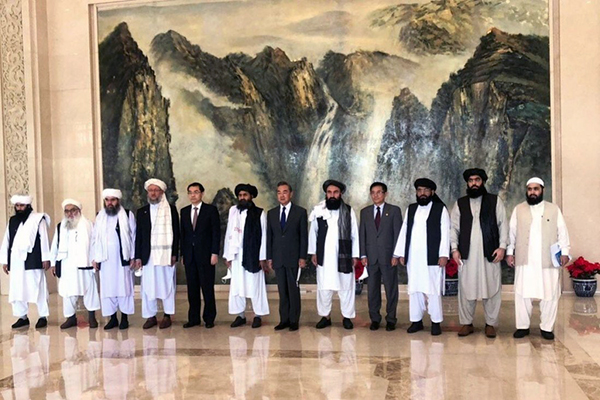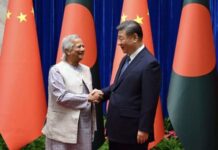
China has come to assume a significant role in the follow-up to the Taliban’s resurgence in Afghanistan, securing its own strategic and economic interests.
China is keeping a hawkish eye on the mineral resources in Afghanistan, especially on lithium and copper. Also, China wants to ensure the security of 60,000 Chinese present in Pakistan for the project linked to the China-Pakistan Economic Corridor (CPEC).
Beijing Meet
Meanwhile, suggesting a willingness to cooperate, Wang Yi hosted a nine-member Taliban delegation, led by the head of the Afghan Taliban Political Commission, Mullah Abdul Ghani Baradar, on July 28 in Tianjin. That the meeting preceding the Taliban victory must have been used to discuss a concrete roadmap for the Taliban. Praising them as “an important military and political force”, Wang Yi urged them to “make a clean break with all terrorist organisations, including the ETIM” and attack them resolutely and effectively. Replying, Baradar hoped for Chinese assistance in reconstruction efforts and assured the Taliban will “never allow any force to use the Afghan territory to engage in acts detrimental to China.” He apparently sidestepped specific mention of the ETIM.
Diplomatic Moves
Within days of the Taliban taking over Kabul, the Chinese foreign ministry said the current Taliban appeared more “clear-headed and rational” than they were when they were in power from 1996 to 2001. Taliban spokesperson Suhail Shaheen told Chinese national broadcaster China CGTN TV that China cold play a big role in the “rebuilding, rehabilitation, reconstruction of Afghanistan.”
China hopes the Afghan Taliban can unite with other political parties and with all ethnic groups and build a political framework in keeping with national conditions that is broadly inclusive and will lay the foundation for enduring peace,” foreign ministry spokeswoman Hua Chunying said after the Taliban took over.
Nervous About Instability
As one of six countries on its border, China has had years to engage inside Afghanistan. Now the landlocked country is even more unstable and without an external presence like U.S. and NATO troops to provide security guarantees.
It sees the success of a radical Islamist movement in Afghanistan as an inherent threat, leaving it even less likely to want to invest in the kind of infrastructure that might open up an already dangerous borderland even further.
Pakistan has deep ties with the Taliban and has long played the role of intermediary with Beijing. Whenever terrorist groups with links with the Taliban have targeted Chinese nationals and projects – in Pakistan, Beijing pressed Islamabad to find those responsible. China has never been fully confident that Pakistan had a real handle on these insurgent groups
China has all along opposed the various UN resolutions and pleas by several global powers to designate the JeM as a global terrorist organization. By implication, therefore, it can be said that China has been supportive of terror groups patronized by Pakistan for cross-border terrorism, targeting India in particular.
China wants to leverage its stranglehold over the Taliban leadership and control Tehreek-e-Taliban Pakistan (TTP) to remain a prime mover in the Afghanistan scheme of things.
Concerns About Xinjiang
Beijing is more concerned that terrorist insurgencies do not spill over into its Xinjiang province, where international human rights organizations and countries like the U.S. and U.K. say China is committing widespread abuses against the local Muslim Uyghur population. Beijing has consistently denied these claims.
Afghanistan could become a potential haven for the Uyghur extremist group, which could retaliate against the “widespread repression of Uyghurs.” Instances of Islamic extremist-linked violence have also occurred in other Muslim-dominated pockets in China, like the Ningxia-Hui Autonomous Region and Yunnan.
Chinese intelligence is aware that Uyghurs have been trained at Al Qaeda training camps in northern Pakistan and Afghanistan and of their presence among the Taliban.
The Taliban’s Chechen, Uzbek, Tajik, Uyghur and other fighters are, however, motivated by jihad, adventure, power and cash. Their victory will attract many others from around the world. They are unlikely to agree to halt the bid to expand their Emirate. Chinese analysts are also apprehensive that China’s problems will increase as the US will now focus its attention on containing China and its rise.
Mineral Rich Country
Afghanistan is home to the world’s largest reserves of lithium – the key ingredient of the large-capacity lithium-ion batteries that are widely used in electric vehicles and the renewable energy industry. And since China dominates Lithium-Ion Battery Production worldwide, it may seek long-term a contract with the Taliban to develop Afghanistan’s massive untapped lithium reserves in return for mining rights and ownership arrangements.
Afghanistan is also rich in several other resources such as gold, oil, bauxite, rare earths, chromium, copper, natural gas, uranium, coal, iron ore, lead, zinc, gemstones, talc, sulphur, travertine, gypsum and marble.
But even though Chinese companies (and mining companies in general) have a higher-than-average tolerance for risk, few have made the decision to enter the market in the war-torn nation.
China has already been burned by failed investments in Afghanistan, most notably the copper project at Mes Aynak, which sits just 25 miles (40 kilometers) outside Kabul. The Taliban had made specific commitments not to attack the mine, but even then, China decided to discontinue its operations.
Belt and Road Projects
Afghanistan’s stability is key to protecting the approximately $60 billion in Belt and Road projects in neighboring Pakistan that provide an overland route to the Indian Ocean.
Taliban spokesperson Zabiullah Mujahid, on 6 September, expressed that the group “desires” to join the CPEC. CPEC is a part of China’s most ambitious project ‘Belt and Road Initiative’, aimed at renewing the country’s historic trade routes in the coastal countries of south-east Asia. With CPEC, Beijing aims to expand its influence in Pakistan and across Central and South Asia in order to counter the influence of the United States and India.
China’s BRI could get more reach if it able to extend the initiative from Pakistan to Afghanistan, with a Peshawar-to-Kabul motorway. The road, which is already being discussed, would create a much shorter land route for faster and convenient access to markets in the Middle East for Chinese goods. A new route through Kabul would also render India’s reluctance to join BRI less consequential.
American Air Bases and Equipment
In what could have serious security implications for India, the Taliban could hand over the Bagram airbase to China and Kandahar base to Pakistan for operational purposes. America’s former envoy to the United Nations Nikki Haley told Fox News, on 1 September, “We need to watch China, because I think you are going to see China make a move for Bagram Air Force Base.”
While a team of aeronautical engineers of the Pakistan Air Force (PAF) had inspected all the five airbases in Afghanistan, including Kandahar, Bagram and Kabul, a delegation of Chinese leaders held a meeting with the Taliban top hierarchy to discuss various security-related issues, including the possible takeover of the Bagram military airfield, sources connected to the ongoing developments said.
The military hardware left behind in Afghanistan by the US could potentially lead to arms proliferation in entire Asia and beyond. Tanks and special vehicles left behind by the Americans in Afghanistan are already being shipped to countries like Pakistan and Iran.
The collusion between Pakistan and China could ultimately land the leftover American military hardware in the hands of Beijing which could reverse engineer the technology to upgrade its military. China could also exploit the detailed analysis of the American military technology for developing counter-technologies like radars and jammers to foil the operational edge of the American military hardware being used by the Indian Defence forces
Comments
The Chinese expect that Afghanistan could form an inclusive and broad-based government, adopting a foreign and domestic policy that is prudent and moderate so as to echo and meet the aspiration and shared will of the international community and its own people. Independent analysts, however, feel that such claims on part of China are mere rhetoric to keep the Taliban and Pakistan in good humour. In reality, Chinese plans are unpredictable and diabolical.
China does not indulge in charity. It is evident that China has already made a deal with the Taliban to extend critical strategic, military, financial, governance support and give Taliban the international authenticity it requires to operate freely. In return, the Taliban has to protect Chinese interests in the region, and allow free access for Chinese colonization of Afghanistan.
Supremacy in the region has a lot to do with controlling the geography of the region. China is going about its old tricks, with natural ease.
The Pakistan state is fully compromised and embedded with China, to work for Chinese strategic, military and political interests. China will use Pakistan to ensure the Taliban will not work against China’s interests and keep tabs on it.
China will exploit the unstable geography around India with its aim to be a global military super-power, sooner than later. China is making its nefarious moves to gain full geo-political control of the region, before taking its challenge to the West.
The Taliban will no doubt offer all kinds of assurances but no one knows how they will govern. Recognizing the group as the de facto political authority and engaging with them makes sense for China.

















